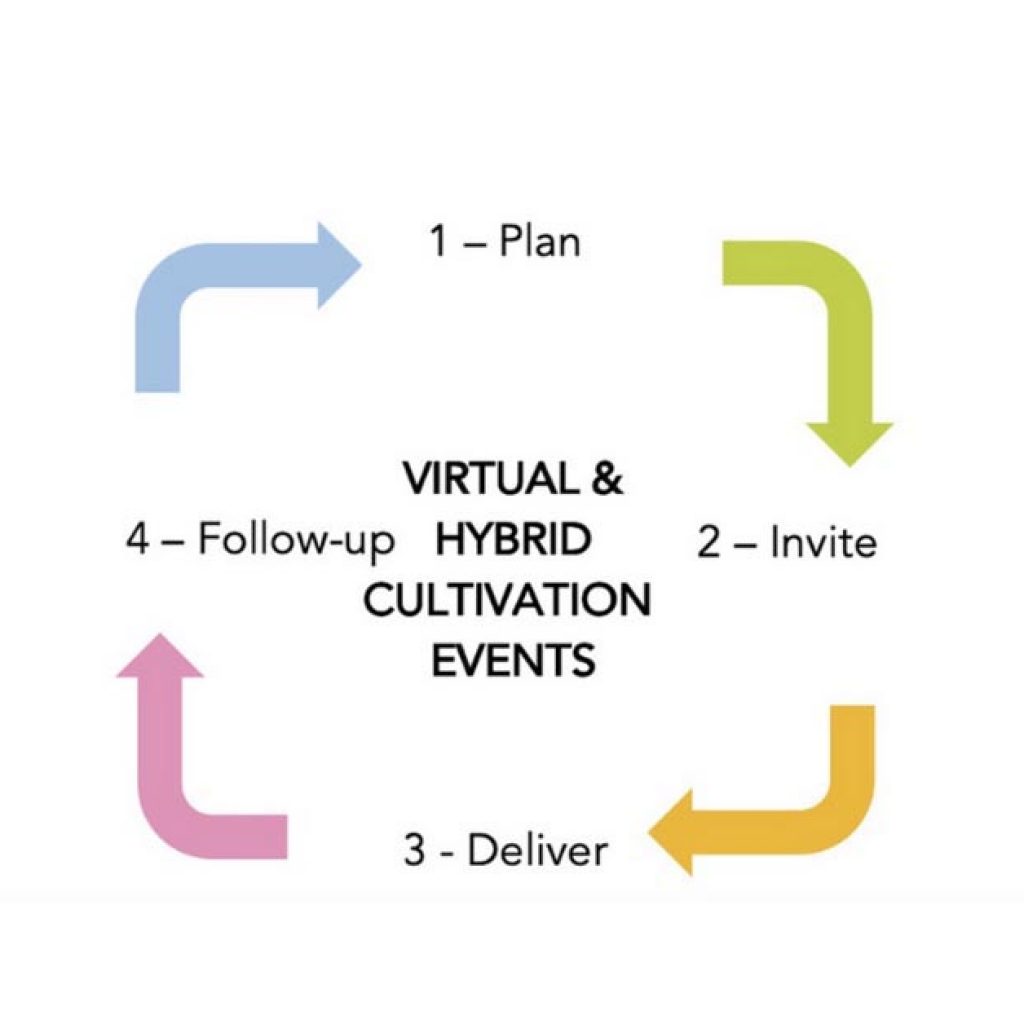Keeping things personal when givers still want to keep their distance

One thing the pandemic has taught us is that, even when resources and opportunities are limited, charitable organisations simply can’t afford stop fundraising. From reviewing their strategy and building resilience, to launching emergency appeals and taking cultivation events online, in testing times the process of finding, asking and stewarding givers is more important than ever.
We also know that successful major gifts fundraising is inherently personal and thrives on a giver’s ability to persuade others to join them. Although social distancing restrictions are easing and we may have more opportunities to share our enthusiasm face-to-face, it’s likely that many potential givers will continue to prefer the virtual space to the physical one. Whether for health reasons, convenience or cost implications, it looks as though virtual and hybrid fundraising events are here to stay.
Cultivation
So, how do charities move forward and develop innovative ways of inviting prospective givers to meet inspirational experts and hear, first-hand, from grateful beneficiaries? In short, how do they cultivate prospects and keep things personal when the new landscape for major gifts fundraising is still evolving?
Over the past 12 months or so, we’ve seen that a great deal can be achieved using virtual technologies and we’re confident that as a hybrid approach to events takes shape, charities will step up to the challenge. Whilst a virtual experience may not have the same social or sensory advantages of a physical encounter, it can be just as informative, even more participative and less disruptive to our daily routines. Framed in a way that reflects the organisation’s DNA and respects the nature of the audience, a well-designed virtual or hybrid event will still attract the interest and support of potential givers.
Based on our experience with clients since the start of the pandemic, here’s a sample of event ideas that have been successfully used to cultivate and steward givers across the Third Sector.
Presentation with Q&A
This is a more traditional approach, supported by platforms like Zoom. A typical running order might be;
- Introduction, giving you buffer-time whilst virtual guests arrive and log-on
- Main presentation including visuals, video clips or panel discussion if appropriate
- Physical and/or virtual breakout conversations for audiences of less than ten. The organisation’s leaders can be available to groups of 2-4, continuing the conversation and fielding individual questions.
- Group Q&A
To make an event like this work, it’s best to focus on smaller numbers and high-profile speakers so that an audience feels included in something quite bespoke and intimate. It’s great if there’s a sense of being the ‘first to hear about’ the latest progress or that guests are taking part in a ‘one-off conversation with the experts.’ Giving people an opportunity to learn something new and appreciate the difference their support will make, is really important.
Themed online events
We’ve seen these events work well with both small and medium sized audiences, where food, drink or themed activities bring an added sense of fun or relevance to the occasion. From providing dinner and drinks, to sending out hot chocolate kits to accompany a virtual campfire, these experiences feel more personal and memorable if the theme sits well with the organisation and the group of prospects they’re focusing on.
iPad buddies
If the goal is to take virtual guests on a tour of facilities or physical spaces, then setting up an ‘iPad buddies’ event can be really impactful. The idea is simple and involves pairing leaders’ or volunteers’ iPads with ones belonging to guests. Through this connection, someone sitting in their kitchen can feel as if they’re literally walking through a hospital, school or gallery with a senior clinician, headteacher or exhibition curator.
Of course, an event like this needs careful set-up and relevant training of volunteers, but organised effectively, it can offer a powerful and direct experience of a fundraising project.
Live-Lounge Panel
For some charitable projects, creating a Live-Lounge event can be a really stimulating way of fostering discussion and debate aimed at existing or potential givers. We’ve seen this work brilliantly with schools, where a ‘join us on the sofa’ invitation allows participants to ‘drop in’ for one or all of the conversation sessions scheduled over two or three hours.
Once again, this kind of event requires careful planning and good technological support. It works best when you have a variety of guests being interviewed, where discussions are tightly focused and there are opportunities for the audience to send in questions. It’s also a great way to showcase a new building or department, drawing attention to the quality of the work that takes place there and the benefits rippling out into the community.

Organising an information event
Organising a successful cultivation or information event, even when this takes place virtually, involves thoughtful planning. There may not be a venue to set up or catering to organise, but there could be other creative or technological requirements to consider. No matter what the size or sector, it’s important that the fundraising team have properly ironed out the details and know exactly who’s responsible for managing the preparations, presentations and IT support. It’s also worth remembering that there’s plenty of external help available. Some platforms have developed software suitable for charitable organisations and can also assist with the conceptual and practical aspects of setting up an event, at a reasonable cost.
Gifted Philanthropy is a full-service fundraising consultancy supporting clients across the Third Sector. You can find out more about the work that we do at www.giftedphilanthopy.com where you can also get in touch to arrange a no-obligations, initial discussion of your fundraising needs with one of our directors.











Recent Comments